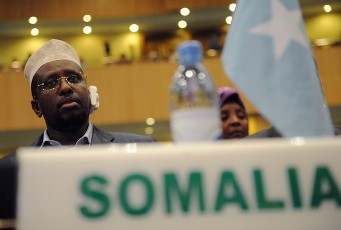African Union under fire for poor response to Somalia famine
By Tesfa-Alem Tekle
August 25,2011 (ADDIS ABABA) – African leaders were mostly absent from a summit held in Ethiopia that convened for the purpose of raising funds to tackle the famine and drought driven humanitarian crisis in Somalia and neighboring countries.

Only the presidents of of Somalia, Djibouti and Equatorial Guinea were in attendance today along with the host Ethiopian Prime Minister Meles Zenawi.
On top of that the pledges made by African nations was nowhere near what was needed.
African Union (AU) Commission chairman Jean Ping told reporters that the donations included $300 million from the African Development Bank (ADB) in loans and grants for long-term development in the Horn of Africa.
There has been conflicting reports on how much individual African nations donated though it appears that it was somewhere around $50 million.
Three African countries provided nearly half of the pledges – Algeria ($10m), Angola ($5m) and Egypt ($5m). Gambia, Mauritania and Congo-Brazzaville gave more than their proportional share, while Nigeria gave only $2m – less than some of its neighbours with smaller economies. South Africa was also tightfisted, with Oxfam pointing out that only $1.3m of its pledge came from government sources (the rest came from individual donations), about the same as from South Sudan, Africa’s newest state.
The AU said in a press release that the funding needs to address the humanitarian crisis in the Horn of Africa has been put at $2.48 billion of which $1 billion has been committed so far.
The Pan-African organization itself has so far pledged just $500,000 from its emergency funds to a relief effort that aid groups say is still short of an estimated $1.48 billion.
The fundraising summit was the first of its kind by the 54 member continental bloc.
“This is the first time Africa is showing solidarity for an African cause,” said AU chairman and president of Equatorial Guinea, Teodoro Obiang Nguema.
Many aid experts, analysts and diplomats said they expected little from the 54-member organisation that has often been perceived as toothless and has seen its funding battered by the absence of its main financier, Libya’s Muammar Gaddafi.
The chairman of the AU Commission, Jean Ping, and other speakers acknowledged the criticisms but said they needed time to prepare and that they had already donated money.
“Some critics alleged that the African Union and its members states have reacted too little, too late,” Ping told delegates. “Ahead of today, many pledges have been made.”
But many NGO’s expressed frustration over the AU’s stance.
“We are disappointed that the pledges are less than the minimum of $50m that Africans Act 4 Africa set as a target,” said the pan-African fundraising group. “If Andrew Adansi-Bonnah, an 11-year-old Ghanaian boy can miss school and travel to Addis Ababa to demonstrate his commitment to raising funds and adding his voice, why couldn’t more African leaders have done the same?”
“If we truly believe in ‘African solutions for African problems’, we need to demonstrate this very clearly, not just in words but in actions,” said Africans Act 4 Africa. “We need to ensure this is not just another talk shop where AU leaders spend a lot of money on travel, protocol and their entourages.”
The UN Deputy Secretary General, Asha-Rose Migiro addressing the summit hailed African leaders for joining hands to tackle continent’s crises, saying they are sending “a clear message to the world that the African Union remains fully engaged with this crisis, and is taking a leading role in all our efforts to save lives.”
Migiro said the UN is doing its level best to address the crises in Somalia and the international response to the crises is accelerating with aid organisations “arriving in greater numbers and aid delivering is increasing in Mogadishu despite restrictions and security concerns”.
(ST)

Ker.
African Union under fire for poor response to Somalia famine
that is why AU is failing to solve African problems, this is the work of AU to mobilize African on such issues.will you not look towards WEST now that you have failed?
Atem Aleu Kiir
African Union under fire for poor response to Somalia famine
African Union (AU) has tried their best and this is how we want you to respond though the respond is bit poor. It is a big attempted and hoping you will do best the second time. You also need to ague all the members to respond to any call by the chairman otherwise it will not work if the members fail to attend the meeting.
richard
African Union under fire for poor response to Somalia famine
African leaders in general will act in almost everything ONLY if there is’ meat to eat’ … hell NO to pledge meat for others to eat …